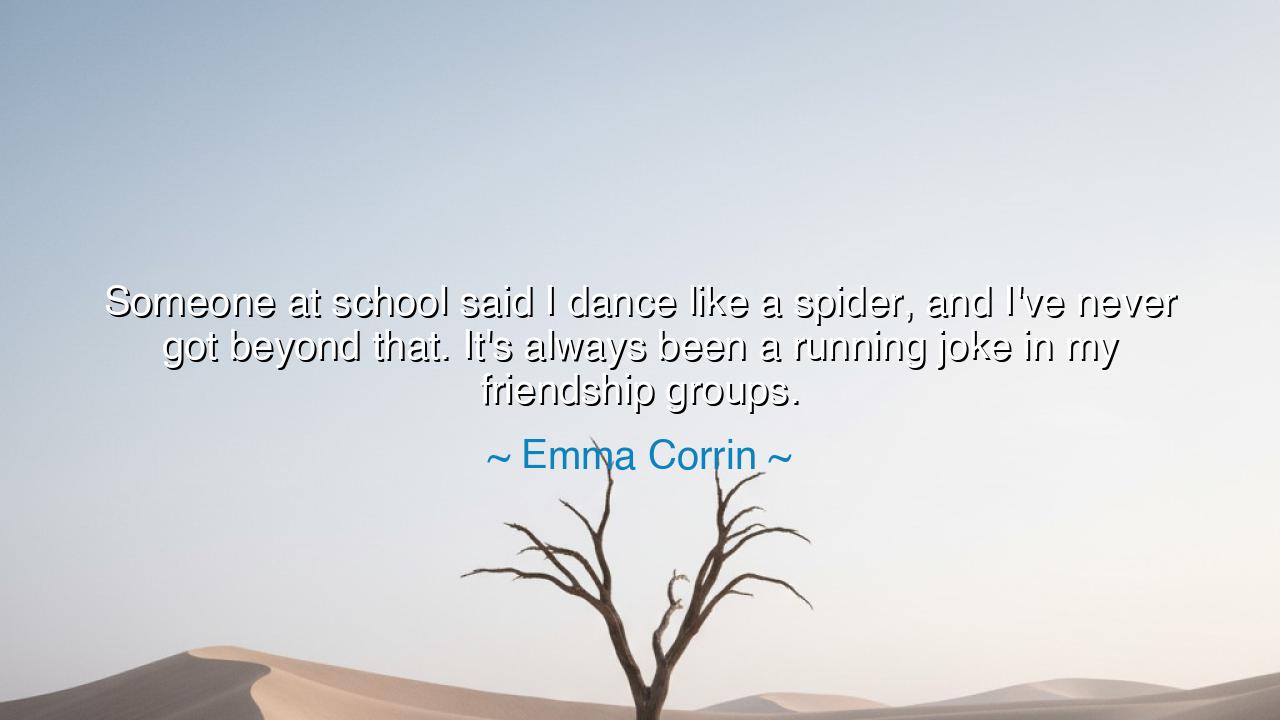
Someone at school said I dance like a spider, and I've never got
Someone at school said I dance like a spider, and I've never got beyond that. It's always been a running joke in my friendship groups.






The English actor Emma Corrin, known for their deeply human portrayals of complex characters, once reflected with gentle humor: “Someone at school said I dance like a spider, and I’ve never got beyond that. It’s always been a running joke in my friendship groups.” Though the words seem playful, they contain a quiet truth about the lasting power of childhood impressions, and how fragile yet enduring our sense of self can be. Beneath the laughter, there is wisdom about vulnerability, acceptance, and the courage to live freely in one’s own skin—even when others see us through the lens of ridicule.
The meaning of this quote is twofold: it is both a story of how easily identity can be shaped by others, and a celebration of how humor can transform wounds into strength. A single comment—spoken perhaps in jest—became a memory that Corrin carried for years. Yet instead of letting it harden into shame, they allowed it to evolve into something lighter, something shared among friends. The “spider dance,” once a sting of self-consciousness, became a symbol of individuality—a reminder that our supposed flaws often hold the seeds of our uniqueness. Thus, Corrin’s reflection is not one of bitterness, but of grace: an acknowledgment that even awkwardness, when embraced, becomes art.
The origin of this kind of truth reaches back to the oldest struggles of humankind: the tension between how we are seen and who we truly are. From the time of the ancients, philosophers and poets have spoken of the mirror that society holds up to the self—and the danger of mistaking reflection for reality. Socrates taught that to know oneself is the beginning of wisdom; yet how hard that becomes in a world that constantly defines us from the outside. Corrin’s “spider” image reminds us how easily external words can weave webs around the spirit, binding it until laughter, love, or courage finally set it free.
History gives us countless examples of those who, like Corrin, turned mockery into mastery. Consider the story of Charlie Chaplin, who as a young performer was told his walk was strange, his movements absurd. Yet it was precisely that exaggerated awkwardness that became the foundation of his genius—the wobbly dance of the “Tramp” that made the world laugh and weep in equal measure. What others called clumsy, Chaplin made poetic. So too, Corrin’s “spider dance” reminds us that what the world mocks today may become the art through which we later inspire others.
There is also a deeper emotional current in Corrin’s words: the endurance of memory. Childhood, that tender forge of identity, often leaves imprints that never fade completely. A careless word from a peer, a laugh at our expense, can echo through the years. But Corrin shows that the way to silence those echoes is not by forgetting, but by reclaiming them—with humor, compassion, and community. In making the “spider” a joke among friends, they turned what once isolated them into a shared bond, proving that laughter can be both shield and sword in the journey toward self-acceptance.
The quote also speaks to the paradox of friendship and self-image. True friends, the kind Corrin describes, are those who laugh with us, not at us—who turn our insecurities into warmth rather than weapons. They teach us that our quirks are not failings but features of our humanity. To dance like a spider, after all, is to move differently, to defy the ordinary rhythm. It is to be unmistakably oneself. And in that difference lies the beauty that art, friendship, and authenticity all require.
The lesson here is luminous: do not let the judgments of others define the rhythm of your soul. The world may mock, misunderstand, or misname you—but you alone decide what to make of it. If they call you awkward, move with pride; if they call you strange, let that strangeness bloom into originality. The spider, though feared, weaves the most intricate designs; the dancer, though imperfect, brings joy through motion. Learn from Corrin’s example—embrace your oddities, for they are the threads that make your life’s web unique.
And so, let this truth be passed on: every word ever spoken about you—kind or cruel—can become part of your art if you choose it. Let the laughter of others become your music, and dance your own dance without apology. For as Emma Corrin teaches, even if the world once told you that you “dance like a spider,” perhaps that only means you were born to spin light in your own remarkable way.






AAdministratorAdministrator
Welcome, honored guests. Please leave a comment, we will respond soon